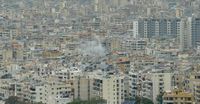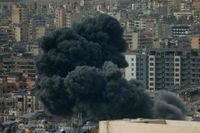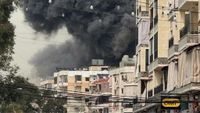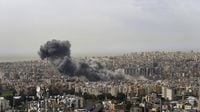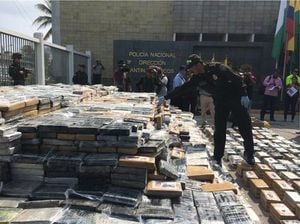Beirut awoke to the sounds of war once again on March 28, 2025, as Israeli warplanes launched a series of airstrikes on the southern suburbs of the Lebanese capital. This marked the first significant military action since a ceasefire was established in November 2024, which had largely halted hostilities between Israel and the Iran-backed Hezbollah organization.
The attacks began at 1:40 p.m. local time, targeting a building in the Hadath neighborhood, which Israeli officials claimed was being used as a drone warehouse by Hezbollah. This response followed the firing of two rockets from southern Lebanon towards the Kiryat Shmona settlement in northern Israel, with one rocket intercepted and the other landing within Lebanese territory.
Israeli Defense Minister Israel Katz justified the airstrikes, stating, "If there is no quiet in Kiryat Shmona and the Galilee communities, there will be no quiet in Beirut either." The Israeli military executed over fifty airstrikes throughout the day, resulting in at least three fatalities and injuring eighteen others, including several children. The strikes sent shockwaves through the city, with residents experiencing panic reminiscent of previous conflicts.
The Lebanese Ministry of Education responded to the chaos by ordering the immediate closure of all schools and universities in the affected suburbs, as parents rushed to evacuate their children amidst the turmoil. Eyewitnesses described scenes of panic, with heavy traffic clogging the roads as families attempted to flee the area.
Hezbollah, while denying involvement in the recent rocket fire, has remained a significant player in the ongoing conflict. The group has consistently claimed adherence to the ceasefire agreement, with its leader, Naim Qassem, emphasizing the organization's commitment to peace. However, the Lebanese government has been criticized for its inability to control the militia's actions and ensure compliance with international agreements.
Lebanon's President Joseph Aoun stated, "Everything indicates that the pro-Iranian group is not responsible for the attack," and called for an investigation into the rocket fire. Despite this, the presence of Hezbollah continues to loom large over the region, complicating efforts for peace and disarmament.
The international response to the escalating violence has been swift, with numerous leaders condemning the Israeli airstrikes. French President Emmanuel Macron labeled the attacks "unacceptable," asserting that they violated the ceasefire agreement and would only serve to empower Hezbollah. Macron announced plans to discuss the situation with U.S. President Donald Trump and Israeli Prime Minister Benjamin Netanyahu in the coming days.
In a statement reflecting the precarious nature of the situation, Israeli Prime Minister Benjamin Netanyahu warned, "We will continue to enforce the ceasefire with strength, strike anywhere in Lebanon against any threat to the State of Israel, and ensure that all our residents in the north return safely to their homes." This declaration underscores the Israeli government's determination to respond aggressively to any perceived threats.
The United Nations has also expressed concern over the renewed violence, with UN special envoy for Lebanon, Jeanine Hennis-Plasschaert, urging restraint. She warned that a return to broader conflict would be devastating for civilians on both sides of the border and called for immediate de-escalation.
As the situation develops, the Lebanese government is under immense pressure to navigate between external influences and internal realities. Prime Minister Nawaf Salam has reached out to international allies to seek support in preventing further Israeli attacks and maintaining stability. However, the persistent presence of Hezbollah complicates these efforts, as the armed group continues to operate with relative autonomy.
In the wake of the airstrikes, Lebanese authorities have reported a rising death toll from Israeli military actions over the past week, with eighteen fatalities attributed to drone, air, and artillery strikes in southern Lebanon. The ongoing violence not only threatens the fragile ceasefire but also risks plunging the region back into full-scale conflict.
As the Lebanese population grapples with the aftermath of the airstrikes, residents remain on edge, fearing further escalation. The psychological impact of the attacks has been profound, with many recalling the horrors of previous wars. The streets of Beirut, once filled with hope for peace, are now shadowed by uncertainty and fear.
With the international community seemingly powerless to alter the course of events on the ground, the potential for a renewed conflict looms large. The ongoing tensions between Israel and Hezbollah, coupled with the complex political landscape in Lebanon, create a volatile environment where every explosion and missile fired brings the region closer to another devastating war.
As the dust settles from the latest round of violence, the question remains: can Lebanon find a path to lasting peace amidst the chaos, or are they destined to repeat the cycles of conflict that have plagued the region for decades?
